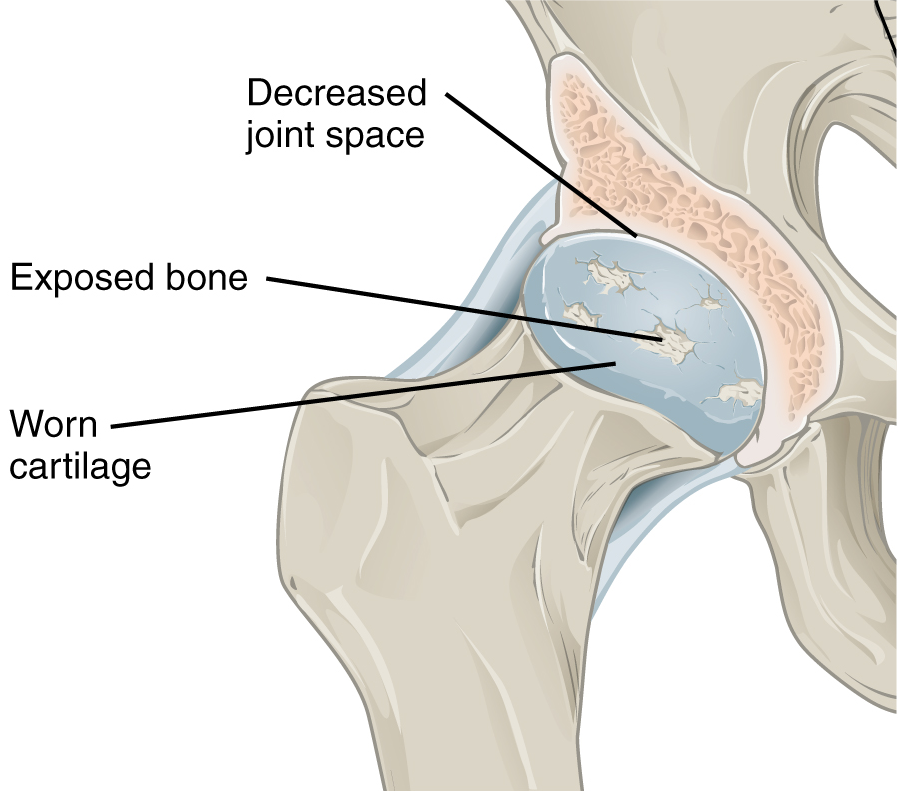HIP ARTHRITIS

Arthritis is a degenerative disease that results in loss of cartilage, or cushion surrounding the ends of the bones. This condition is usually from overuse or wear and tear over time. It is also known as osteoarthritis (OA), or degenerative joint disease.
There are many different types of arthritis, but the most common is osteoarthritis. If caught early, arthritis can be managed and Dr. Nelson may be able to help you prevent severe wear on your cartilage, but he can also offer hip replacement for those who have severe damage to their hips.
Symptoms of Hip Arthritis
- Pain: Commonly felt in the groin, or around the hip bone, where the front pocket of jeans might rest. It may radiate down the thigh to the knee but typically does not radiate past the knee.
- Decreased Mobility: Pain is typically increased with weight-bearing activities such as rising from a chair or walking. You may have a limp due to increased pain; this can be improved by using an assistive device such as a cane in the opposite hand.
- Limited Hip Motion: Degeneration of the hip joint can lead to limited range of motion. This can cause difficulty putting on shoes and socks, and lifting the leg to get in and out of a car.
Diagnosis
An X-ray is typically used to diagnose osteoarthritis. The X-ray will show a narrowing of the joint space between the femoral head (ball) and the acetabulum (socket). It may also show bone spurs and other signs of degeneration.
A physical examination from an orthopedic specialist or primary care provider can also aid in the diagnosis of arthritis.
The Different Kinds of Arthritis
Dr. Nelson mainly treats osteoarthritis, which damages the cartilage around a hip joint and can eventually damage the bone itself. But there are many other kinds of arthritis that also cause hip pain. Dr. Nelson will work with you to find solutions for your arthritis, no matter what kind it is.
Hip pain caused by AVN often starts as a mild ache or discomfort in the groin, thigh, or buttocks, but it can progress to debilitating pain. While AVN can affect anyone, certain factors like trauma, long-term steroid use, excessive alcohol consumption, or medical conditions such as lupus, HIV, sickle-cell disease, and others can increase the risk.
Autoimmune Arthritis
There are two kinds of arthritis that are linked to autoimmune issues:
- Rheumatoid Arthritis: Your immune system will attack your joints and muscles instead of attacking germs and viruses in the body, causing inflammation and pain.
- Lupus: Lupus is an autoimmune issue that attacks your healthy tissues, including cartilage and organs.
For severe cases of these kinds of arthritis, hip replacement may be necessary to combat the deterioration of the cartilage and tissue surrounding your hips. Dr. Nelson and his team will also work with you on non-surgical approaches to lessen your pain and inflammation.

Gout
Gout is caused by a buildup of uric acid in a single joint or all of your joints. It can cause pain and discomfort, and will eventually begin to damage your joints. Preventing gout is essential to avoiding a hip replacement, but if it has already progressed, Dr. Nelson can replace your hip to treat the damage from the gout.
This disease occurs when the kidneys are overwhelmed and cannot filter toxins out of your body as effectively as they should. If you have weakened kidneys or consume high amounts of alcohol, you are more susceptible to gout.
The Benefits of Seeing a Doctor Early
Dr. Nelson highly values the importance of treatments that don’t require surgery, such as:
Tips for Managing Hip Arthritis at Home
Managing hip arthritis at home involves a few simple but effective strategies:
- Make sure to maintain good posture and avoid prolonged sitting
- Stay active with low-impact exercises like walking, swimming, or yoga
- Apply heat or cold packs to the hip area to help reduce pain and stiffness
- Maintaining a healthy weight can also relieve pressure on your hips, easing discomfort
- Consider using supportive aids, such as a cane, to reduce stress on the joint
While it may feel counterintuitive to exercise your hip while it hurts, it can actually help you gain muscles that support your hip, and relieve some of the stiffness that can be associated with arthritis.
Treatment Options
Non-Surgical Solutions
It is recommended that you initially treat hip pain caused by arthritis with non-operative interventions. Here are some of the non-operative treatment options:
- Activity modification
- Weight loss through diet and exercise
- Use of an assistive device (i.e cane, walker) to off-load the lower extremity
- Physical therapy to strengthen the surrounding hip musculature
- Medications such as Tylenol or NSAIDs (nonsteroidal anti-inflammatory drugs)
- Hip injections of various medications
Surgical Solutions
If non-surgical options are no longer beneficial, hip replacement may be an option to treat hip pain caused by arthritis.
Hip replacements are best for the kinds of arthritis that damage your hip physically and cause stress on the cartilage. With a hip replacement, you can receive a new lease on life. Experience the joys of walking and living life with less pain.

Preventing Osteoarthritis
Preventing hip arthritis is all about taking proactive steps to protect your joints, especially as you enter retirement and want to stay active.
Healthy Weight: One of the best ways to prevent hip arthritis is to maintain a healthy weight. Excess weight puts added stress on your hip joints, leading to faster wear and tear on the cartilage. By keeping your weight at a healthy level, you reduce the strain on your hips, allowing them to stay healthier for longer.
Physical Activity: Staying physically active is also essential. Low-impact exercises like walking, swimming, or cycling help keep your hip joints flexible and strengthen the muscles around them, providing added support. Building muscle strength, especially in the hips, thighs, and core, can help stabilize your joints and reduce the risk of arthritis.
Good Posture: Additionally, be mindful of your posture and body mechanics, especially during everyday activities like lifting, bending, or even gardening. Using proper techniques reduces unnecessary strain on your hips.
Balanced Diet: Finally, don’t overlook the importance of a balanced diet rich in calcium, vitamin D, and omega-3 fatty acids to support joint health. By making these lifestyle choices now, you can help keep hip arthritis at bay and enjoy an active, pain-free retirement for years to come.
Learn More About Managing Arthritis
Dr. Nelson is here for you and your family as you learn about and manage your hip arthritis. If you’re looking for answers or are considering hip replacement options, start by filling out our pain evaluation form. This will help us understand your needs and allow us to reach out to schedule a consultation tailored to your situation. Take the first step toward relief and a more active lifestyle today.